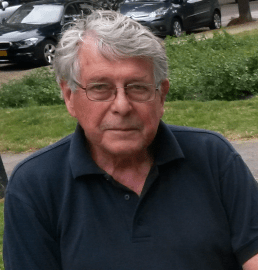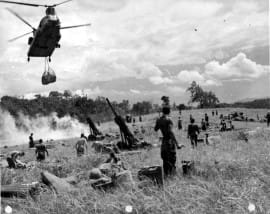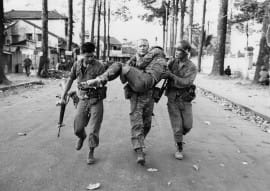A Very Personal Experience US Army December 9, 2015
 I graduated from Dartmouth, a Distinguished Military Graduate and a Second Lieutenant, US Army Infantry. After training I was assigned to an airborne infantry battalion in Germany, protecting Western Europe. Our duties included jumping out of C130s, guarding nuclear weapons and field exercises. As a captain, age 26, I was assigned to Vietnam. I trusted my government to make the best decisions regarding use of military force and I was willing to do my part.
I graduated from Dartmouth, a Distinguished Military Graduate and a Second Lieutenant, US Army Infantry. After training I was assigned to an airborne infantry battalion in Germany, protecting Western Europe. Our duties included jumping out of C130s, guarding nuclear weapons and field exercises. As a captain, age 26, I was assigned to Vietnam. I trusted my government to make the best decisions regarding use of military force and I was willing to do my part.
In June 1967 I arrived at Hill 59, outside Chu Lai, south of Hue, 2nd Battalion, 1st Infantry, 196th Light Infantry Brigade, and took command of Delta Company. I had been given no training in the type of combat in Vietnam – heliborne assaults, search and destroy, adjusting close air support…
Four days later we made a “hot insertion” – going into a landing zone (LZ) under fire – 10 helicopters, each with five of my men. The approach to the LZ was my baptism of fire. I was in the lead helicopter with the commander of the flight. The chaos was incre dible. The machine guns on the helicopters were firing, artillery rounds were exploding along our route, and jet fighters were strafing the LZ and dumping napalm. Then the major said, “OK Captain, it’s up to us, do we go in or not.” I had no way of making such a decision; I didn’t even know I was supposed to make it. That made me angry. We went in, the LZ reeking of burned vegetation and napalm. Jumping out of the choppers hovering a few feet off the ground. I could see the incoming fire hitting the rice paddy dikes.
dible. The machine guns on the helicopters were firing, artillery rounds were exploding along our route, and jet fighters were strafing the LZ and dumping napalm. Then the major said, “OK Captain, it’s up to us, do we go in or not.” I had no way of making such a decision; I didn’t even know I was supposed to make it. That made me angry. We went in, the LZ reeking of burned vegetation and napalm. Jumping out of the choppers hovering a few feet off the ground. I could see the incoming fire hitting the rice paddy dikes.
Over the next months I became another person – driven by my responsibilities of accomplishing the mission and protecting the 160 men under my command. I called in artillery fire and close air support to kill men I didn’t know. I sent young American soldiers on patrols knowing some of them would not come back alive. I loaded seriously wounded men onto medevac helicopters, their blood dripping through my hands. I was an effective commander, devoid of human feeling, capable of very terrible things in the cause of “making the world free for democracy.”
 Several heliborne assaults later things were building up to the Tet offensive. We had slogged through rice paddies, receiving sporadic incoming fire. We settled in on a hill. I adjusted the defensive artillery fire and sent out listening posts as an early warning system. It was very dark and raining. We were attacked. I used all the capabilities available – artillery, naval gunfire and our own small arms. We survived with casualties. A general told me we had spent over $3 million on naval gunfire alone.
Several heliborne assaults later things were building up to the Tet offensive. We had slogged through rice paddies, receiving sporadic incoming fire. We settled in on a hill. I adjusted the defensive artillery fire and sent out listening posts as an early warning system. It was very dark and raining. We were attacked. I used all the capabilities available – artillery, naval gunfire and our own small arms. We survived with casualties. A general told me we had spent over $3 million on naval gunfire alone.
At a safe compound, I sat watching my men, tattered by a night of intense combat, fatigued, dirty, dazed. Then it struck me. This was a stupid way to make the world free for democracy. We were young men, trying to kill each other over a piece of real estate of no consequence, spending huge amounts of money with no result whatsoever. I submitted my resignation. I remained in the Army until my resignation was accepted. Perhaps I was morally weak at this point. I could have gone AWOL, joined the anti-war protesters, moved to Canada or Holland, but I was devastated, sick of violence, morally empty.
Back in the US, I came to realize that the war had been unnecessary politically and poorly executed by the military. Perhaps worse, our political leaders learned no lesson from it. To paraphrase Hagel, “The only thing people learn from history is that people never learn from history.” For years I was haunted by nightmares. I had difficulties in interpersonal relationships. I find writing this extremely difficult.
Slowly I regained my humanity. I became a pacifist, campaigning against the Iraq war. I continue to support veterans’ causes, believing that if we don’t take care of the wounded warriors whom we sent to war we lose a piece of our soul.
Also read JAI director Tracy Metz’s introduction (December 2), editor Phillip C. Schaefer’s introduction (December 4), the essay by veteran Jim Harris (December 7), the essay by Karl F. Winkler (December 14), the essay by George J. Fesus (December 16), the essay by veteran Carl DuRei (December 18), the essay by James Laughlin (December 21), the essay by John T. Lane (December 23), and the essay by Bud McGrath (December 27).